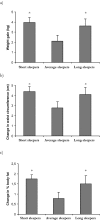The association between sleep duration and weight gain in adults: a 6-year prospective study from the Quebec Family Study - PubMed (original) (raw)
The association between sleep duration and weight gain in adults: a 6-year prospective study from the Quebec Family Study
Jean-Philippe Chaput et al. Sleep. 2008 Apr.
Abstract
Study objective: To investigate the relationship between sleep duration and subsequent body weight and fat gain.
Design: Six-year longitudinal study.
Setting: Community setting.
Participants: Two hundred seventy-six adults aged 21 to 64 years from the Quebec Family Study. More than half of the sample is drawn from families with at least 1 parent and 1 offspring with a body mass index of 32 kg/m2 or higher.
Measurements and results: Body composition measurements and self-reported sleep duration were determined. Changes in adiposity indices were compared between short- (5-6 hours), average- (7-8 hours), and long- (9-10 hours) duration sleeper groups. After adjustment for age, sex, and baseline body mass index, short-duration sleepers gained 1.98 kg (95% confidence interval: 1.16-2.82) more and long-duration sleepers gained 1.58 kg (95% CI: 1.02-2.56) more than did average-duration sleepers over 6 years. Short- and long-duration sleepers were 35% and 25% more likely to experience a 5-kg weight gain, respectively, as compared with average-duration sleepers over 6 years. The risk of developing obesity was elevated for short- and long-duration sleepers as compared with average-duration sleepers, with 27% and 21% increases in risk, respectively. These associations remained significant after inclusion of important covariates and were not affected by adjustment for energy intake and physical activity participation.
Conclusions: This study provides evidence that both short and long sleeping times predict an increased risk of future body weight and fat gain in adults. Hence, these results emphasize the need to add sleep duration to the panel of determinants that contribute to weight gain and obesity.
Figures
Figure 1
Mean (a) weight gain, (b) change in waist circumference, and (c) change in percentage of body fat by sleep-duration group. The model was adjusted for age, sex, baseline body mass index, study phase, length of follow-up, resting metabolic rate, smoking habits, employment status, education level, total annual family income, menopause status, shift-working history, alcohol intake, coffee intake, total caloric intake, and participation in vigorous physical activity. *Significantly different from the 7–8 hours sleeping group (average sleepers), P < 0.05.
Similar articles
- The association between short sleep duration and weight gain is dependent on disinhibited eating behavior in adults.
Chaput JP, Després JP, Bouchard C, Tremblay A. Chaput JP, et al. Sleep. 2011 Oct 1;34(10):1291-7. doi: 10.5665/SLEEP.1264. Sleep. 2011. PMID: 21966060 Free PMC article. - Longer sleep duration associates with lower adiposity gain in adult short sleepers.
Chaput JP, Després JP, Bouchard C, Tremblay A. Chaput JP, et al. Int J Obes (Lond). 2012 May;36(5):752-6. doi: 10.1038/ijo.2011.110. Epub 2011 Jun 7. Int J Obes (Lond). 2012. PMID: 21654631 - Short sleep duration is associated with reduced leptin levels and increased adiposity: Results from the Quebec family study.
Chaput JP, Després JP, Bouchard C, Tremblay A. Chaput JP, et al. Obesity (Silver Spring). 2007 Jan;15(1):253-61. doi: 10.1038/oby.2007.512. Obesity (Silver Spring). 2007. PMID: 17228054 - Sleep disturbances, body fat distribution, food intake and/or energy expenditure: pathophysiological aspects.
St-Onge MP, Shechter A. St-Onge MP, et al. Horm Mol Biol Clin Investig. 2014 Jan;17(1):29-37. doi: 10.1515/hmbci-2013-0066. Horm Mol Biol Clin Investig. 2014. PMID: 25372728 Free PMC article. Review. - Visceral adiposity and inflammatory bowel disease.
Rowan CR, McManus J, Boland K, O'Toole A. Rowan CR, et al. Int J Colorectal Dis. 2021 Nov;36(11):2305-2319. doi: 10.1007/s00384-021-03968-w. Epub 2021 Jun 9. Int J Colorectal Dis. 2021. PMID: 34104989 Review.
Cited by
- Joint Consensus Statement of the American Academy of Sleep Medicine and Sleep Research Society on the Recommended Amount of Sleep for a Healthy Adult: Methodology and Discussion.
Consensus Conference Panel; Watson NF, Badr MS, Belenky G, Bliwise DL, Buxton OM, Buysse D, Dinges DF, Gangwisch J, Grandner MA, Kushida C, Malhotra RK, Martin JL, Patel SR, Quan SF, Tasali E. Consensus Conference Panel, et al. Sleep. 2015 Aug 1;38(8):1161-83. doi: 10.5665/sleep.4886. Sleep. 2015. PMID: 26194576 Free PMC article. - Self-reported short sleep duration and insomnia symptoms as predictors of post-pregnancy weight change: Results from a cohort study.
Rognmo K, Sivertsen B, Eberhard-Gran M. Rognmo K, et al. Womens Health (Lond). 2016 Sep;12(5):465-474. doi: 10.1177/1745505716668871. Epub 2016 Sep 15. Womens Health (Lond). 2016. PMID: 27634975 Free PMC article. - Sleep duration and weight loss among overweight/obese women enrolled in a behavioral weight loss program.
O'Brien EM, Fava J, Subak LL, Stone K, Hart CN, Demos K, Wing R. O'Brien EM, et al. Nutr Diabetes. 2012 Sep 10;2(9):e43. doi: 10.1038/nutd.2012.17. Nutr Diabetes. 2012. PMID: 23446658 Free PMC article. - Associations between Sleep Duration and Anthropometric Indices of Adiposity in Female University Students.
Borowska B, Suder A, Kliś K, Wronka I. Borowska B, et al. Int J Environ Res Public Health. 2022 Sep 16;19(18):11681. doi: 10.3390/ijerph191811681. Int J Environ Res Public Health. 2022. PMID: 36141950 Free PMC article. - Sleep and Obesity.
Ding C, Lim LL, Xu L, Kong APS. Ding C, et al. J Obes Metab Syndr. 2018 Mar 30;27(1):4-24. doi: 10.7570/jomes.2018.27.1.4. J Obes Metab Syndr. 2018. PMID: 31089536 Free PMC article. Review.
References
- Kripke DF, Simons RN, Garfinkel L, Hammond EC. Short and long sleep and sleeping pills. Is increased mortality associated? Arch Gen Psychiatry. 1979;36:103–116. - PubMed
- 2000 “Sleep in America” Poll. Washington: National Sleep Foundation; 2000. Available at http://www.sleepfoundation.org/site/c.huIXKjM0IxF/b.2417141/k.2E30/The_N....
- 2001 “Sleep in America” Poll. Washington: National Sleep Foundation; 2001. Executive summary. Available at http://www.sleepfoundation.org/site/c.huIXKjM0IxF/b.2417141/k.2E30/The_N....
- 2002 “Sleep in America” Poll. Washington: National Sleep Foundation; 2002. Available at http://www.sleepfoundation.org/site/c.huIXKjM0IxF/b.2417141/k.2E30/The_N....
- Bonnet MH, Arand DL. We are chronically sleep deprived. Sleep. 1995;18:908–911. - PubMed
